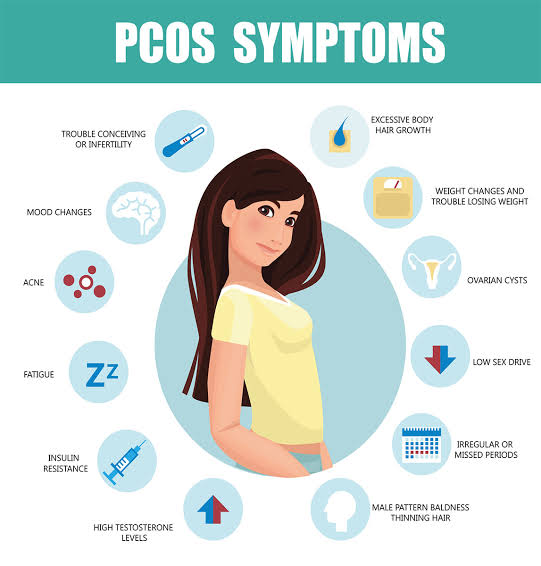*Says, they risk infertility
By Francesca Hangeior.
As the world commemorates this year’s Polycystic Ovary Syndrome Awareness Month, a fertility specialist, Dr. Abayomi Ajayi, has said about 70 percent of women living with the condition are not aware that they have it due to ignorance.
PCOS is a common hormonal condition that affects women of reproductive age.
Ajayi, who is Medical Director, Nordica Fertility Centre, Lagos, said PCOS was a prevalent cause of infertility, especially anovulatory infertility.
He also stated that PCOS was the most common cause of hormonal disorders in women of reproductive age, causing disrupted ovulation and a lack of regular menstruation.
The consultant gynaecologist disclosed this during a webinar organised by the fertility centre to commemorate this year’s PCOS awareness month aimed at raising awareness about the condition.
PCOS Awareness Month is a global healthcare event observed annually throughout September. It aims to improve the lives of those affected by the condition, help them overcome their symptoms, and prevent and reduce their risks for life-threatening diseases such as diabetes.
The World Health Organisation says PCOS affects an estimated eight to 13 per cent of reproductive-aged women.
The global health body also states that up to 70 percent of women with the condition remain undiagnosed worldwide despite being a leading cause of infertility.
“PCOS is a common hormonal condition that affects women of reproductive age. It usually starts during adolescence, but symptoms may fluctuate over time.
“PCOS can cause hormonal imbalances, irregular periods, excess androgen levels, and cysts in the ovaries. Irregular periods, usually with a lack of ovulation, can make it difficult to become pregnant.
“PCOS is a chronic condition and cannot be cured. However, some symptoms can be improved through lifestyle changes, medications, and fertility treatments”, the WHO said.
Ajayi pointed out that the exact cause of PCOS was unknown, adding however that the condition could be genetic.
The consultant gynaecologist said, “September is PCOS awareness month, and that is why we have gathered here today to dispel the myths about PCOS, raise awareness, and offer support to women who are living with the condition so that we can empower them to take care of their health.
“PCOS has no cure, so it is something that they are going to live with for the rest of their lives. So they should understand it. It is a common abnormality in women, and it is a common cause of infertility, especially anovulatory infertility.
“It is estimated that 10 to 15 percent of women will have PCOs. Unfortunately, about 50 to 70 percent of them will not be diagnosed. So, there are still a lot of misdiagnoses and underdiagnoses going on.”
He noted that due to misdiagnoses, a lot of women were labeled to have PCOS when they were not, and the people who had PÇOs were not diagnosed most of the time.
“So, we must talk about this and ask questions. Why are we having misdiagnosis? We have this because people rely on laboratory results and that might not be true. Two out of three symptoms must be present before diagnosis of PCOS is done”, he said.
According to him, symptoms vary from woman to woman, with some experiencing milder symptoms and others more severe.
“Symptoms are linked to hormones, with women with PCOS having slightly higher testosterone levels, leading to facial hair growth, and insulin resistance, a condition where the body doesn’t respond to insulin, increasing glucose levels and leading to weight gain and fertility issues”, he added.
The maternal health expert explained that the treatment for PCOS and infertility often begins with an ultrasound diagnosis, which helps determine the necessary tests.
“Physical examinations, including height, weight, facial or body hair growth, acne, and discoloration of the skin under the arms, breasts, and groin, can help diagnosis. Insulin resistance, common to PCOS, may play a role in weight gain and the difficulty of losing any extra weight.
“With fertility medications, the chances of getting pregnant with PCOS are quite favorable. Although there is currently no cure for PCOS, some women’s periods do normalize after birth, and those with fertility issues may find it easier to conceive again. IVF is an excellent choice, but its effectiveness depends on individual factors such as age, length of infertility, and weight.
“Many women with PCOS suffer from physical or psychological manifestations of depression, which should be sought by a doctor who is willing to listen to concerns and not dismiss this potential side effect of PCOS,” Ajayi said.
He advised women with the condition to see a maternal health specialist for proper evaluation and appropriate treatment.
“Women with PCOS need a proper evaluation of infertility. If the cause is just PCOS, they will do ovulation induction with drugs and drugs are available.

